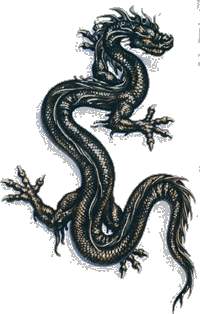|
The dragon is a homiothermic reptile. In otherwords, it is a warm-blooded creature and its body temperature is controlled internally. This characteristic enables it to adapt to the different climates of its very extensive habitat and to maintain its activities both day and night throughout the year, as it is not dependent on the warmth from the sun like the other reptiles. The dragon generally has wings, and its bones are hollow, like a bird. There are dragons, usually ancient survivors from the distant past, with stumpy legs and no wings.

These rare survivors of a remote era are intelligent and fairly aggressive, and belong to a single species known as 'worms of the deep', a species on the verge of extinction. This creature lives for a very long time. There are records of dragons who have lived for five hundred and even a thousand years, but there are no known cases of dragons who have died from old age. On the other hand, they die from accidents, certain diseases or as a result of the actions of their most relentless enemy: man. The worst disease is scale corrosion, which can be fatal. 'Senile dementia' is more common among Earth Dragons, while acute gastritis iron virginae affects mainly the Water Dragon, who has an extremely delicate stomach. Despite its strength, the dragon loses some of its agility with age, easily falling prey to the singular and terrible dragon-killer, the armor-plated Ichneumon. This swamp dweller, which Pliny describes in its Historia Naturalis as a spindle-shaped mud fish with a sharp snout, covered with tough plates, is the dragon's mortal enemy. The Ichneumon burrows between the dragon's scales and, using its sharp snout, tunnels through the tender flesh until it reaches the entrails, which it devours, killing its victim.
The dragon can talk, and its natural language is Latin, a tongue which is innate in the dragon species, but it has no difficulty in learning and expressing itself correctly in the vernacular of the region in which it lives.
A lover of woodlands and fresh air, the dragon cannot bear environmental pollution or the tumult of civilization. Today, the dragon survives only in those rare places that have escaped pollution, small isolated pockets of the Old World, which is why the future of the dragon seems precarious SENSES
Dragons have the same senses as humans; sight, smell, hearing, touch, and taste. But some have a sixth sense which is being able to "read" the emotion of another being. Their regular five senses are incredibly sensitive. For example, the sense of smell is about 100 times more sensitive than a bloodhound dog. They can smell and hear a person or animal from a couple miles away!
Their sixth sense is very accurate at close range. If a person or animal is feeling a strong emotion, such as fear or hate, it will register very strongly to the dragon, even if it is not in visual range of it. This is where dragonfear comes from. Dragonfear is an all encompassing, frozen-in-place fear that the dragon causes upon the animal or person seeing a dragon. The dragons sometimes use this advantage to beat its foes, such as thieves or slayers. Only the very bravest or very dim-witted are not affected by this terrible fear. This is usually an aura around evil-minded dragons, but in a friendly dragon, such as the Faerie Dragon, this aura is non-existant.
|

